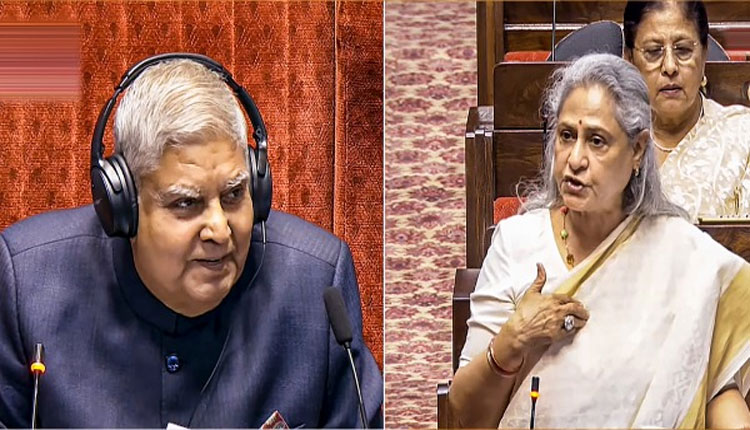NewDelhi: Jaya Bachchan’s outburst in the Rajya Sabha on Friday, August 9, has stirred a significant controversy, raising questions about decorum in the House. The incident occurred when the Chairman of the Rajya Sabha, Vice President Jagdeep Dhankhar, addressed the Samajwadi Party MP as “Jaya Amitabh Bachchan,” which led to a heated response from the veteran actress-turned-politician.
The Chairman’s use of her full registered name sparked an angry reaction from Bachchan, who accused him of being sarcastic. “Your tone is sarcastic. I am an actor, and I understand a person’s body language. You and I are both colleagues. This kind of language does not suit you,” she said, visibly upset.
This incident prompted the Chairman to leave the House, leaving many to question the appropriateness of the exchange. According to the rules of parliamentary procedure, members are addressed by the name they have registered in the House. In Jaya Bachchan’s case, her registered name includes her husband’s name, which she had not previously contested during her long tenure in the Rajya Sabha.
The episode has also sparked a broader debate about naming conventions in India. In many regions, it is customary for women to adopt their husband’s name after marriage, a practice that varies significantly across the country. For instance, in states like Maharashtra and Gujarat, it is common for women to incorporate their husband’s surname and even first name into their own. Conversely, in parts of North and East India, women often retain their maiden names or only adopt their husband’s surname.
Jaya Bachchan’s reaction has also brought attention to the cultural diversity and differing traditions across India regarding naming practices. Critics argue that if Bachchan no longer wishes to be addressed with her husband’s name, she should formally request a change with the Rajya Sabha Secretariat, rather than disrupting the proceedings of the House.
The timing of this controversy is particularly significant as it comes amidst a walkout by the opposition, which was already in progress due to remarks made by BJP member Ghanshyam Tiwari about the Leader of Opposition. Bachchan’s protest was quickly absorbed into the broader dissent against the ruling party.
Political observers have noted that Jaya Bachchan’s actions could have wider implications for her party, the Samajwadi Party, particularly with upcoming assembly elections in Haryana. The state’s political landscape is currently dominated by a Jat versus non-Jat narrative, and the BJP, which has been struggling with Jat community support, could potentially leverage this incident to their advantage, especially since the Rajya Sabha Chairman, Jagdeep Dhankhar, is himself a Jat.
As the dust settles, the incident underscores the importance of understanding and respecting both cultural diversity and procedural norms within India’s legislative bodies. For Jaya Bachchan, it also serves as a reminder of the need for careful consideration in how such matters are handled within the sanctity of the Rajya Sabha.



Comments are closed.